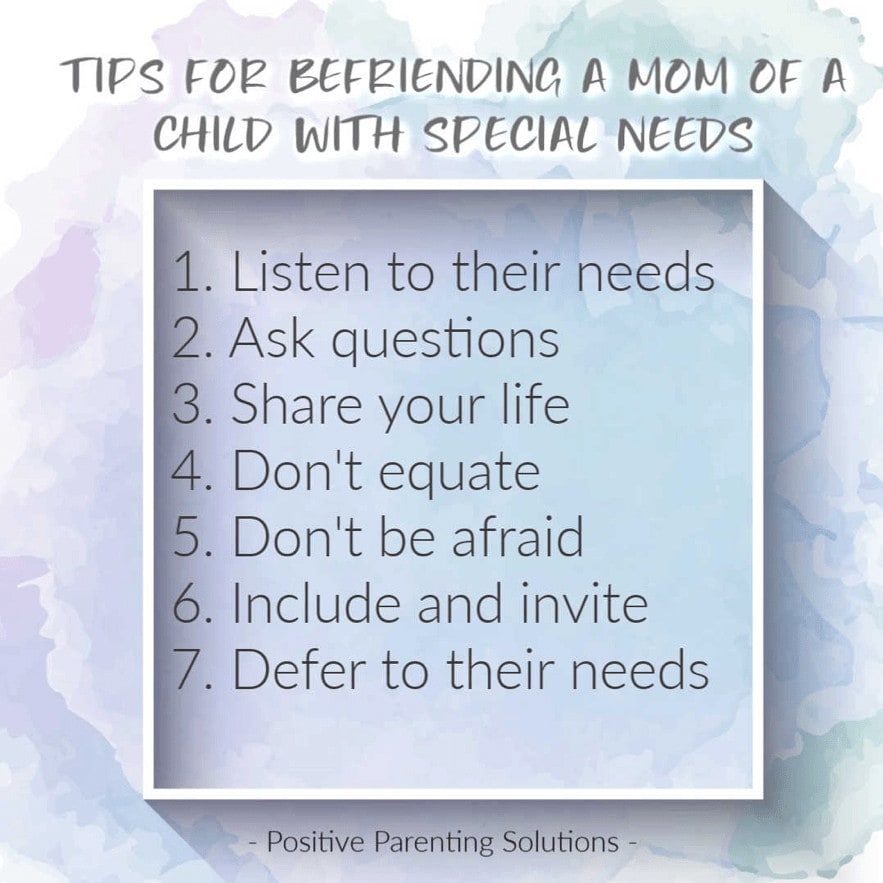Befriending the Mom of a Child With Special Needs: 7 Tips For Success

“Look mom! That boy’s in a wheelchair!”
“Why is she wearing that brace on her leg?”
“Why is that boy talking like a baby?” or “Why isn’t he talking at all?”
“Why is she making those sounds?”
“Look! That little girl is missing an arm.”
From the mouths of babes flow the most uninhibited and awkward questions, am I right?
When these innocently curious questions flow at a decibel level that can be heard by every shopper in the next 3 aisles, it’s enough to make any parent awkwardly shuffle to the exit at break-neck speed–while shushing and whispering to their inquisitive child.
Even though our kids’ comments are completely innocent, we’re embarrassed because we don’t want to hurt feelings or cause any more stress for the mom or dad who’s already dealing with more than their share of challenges.
And, we also struggle with our OWN responses when interacting with parents of kids with special needs. We don’t know what to say. Should we say anything at all? Should we offer to help? Our intentions are always good, but we struggle with the “right” thing to do–and so sometimes we do nothing at all. All too often we opt to avoid engagement instead of leaning into it.
The problem is, when we rush our kids away from children with differences or we fail to step up to befriend a mom of a kid with special needs, we not only miss the joy that might come from that new friendship, but we increase the chasm of understanding between us.
I’ve been a parenting educator for 15+ years to families with typical children and those with special needs. While the positive parenting strategies I teach are effective for ALL children–sometimes with additional therapies–I know it can be awkward and difficult for parents to bridge the gap and build relationships with one another.
To help parents of typical children build meaningful relationships with those whose children have special needs, I went straight to the source. I asked several parents from our Positive Parenting Solutions community what advice they’d like other parents to have when building friendships.
While we know every family situation is unique, similar themes were consistently shared from parents in our community who are parenting children with special needs.
If you’re a parent of typical children trying to befriend a mom of a child with special needs, here are 7 tips for success:
1. Listen to Their Needs
While it’s true that we can ALL be better listeners, it’s incredibly important to listen to any needs your new friend is sharing. Make note of their potential allergies, their feeding schedule, their medication schedule, etc. If a new friend is sharing these things early on in a relationship, she knows it’s important for your understanding.
Essentially, she’s saying, “Head’s up, if you want to do life with me, here’s what it looks like for my family.” Prime your ears to listen and you’ll be well-equipped to build a solid friendship.
2. Ask Questions…Even the Hard Ones!
This part may feel awkward or scary, but many moms of children with special needs say “Please ask! We WANT to talk about it. After all, it’s ALL we think about and we want to share that part of our life with you.”
They’d rather give you accurate information than have you conjure up incorrect information about their children on your own.
As long as your questions are coming from a place of genuine love and curiosity, most moms are thrilled when you ask questions. This shows you recognize the challenges they might be facing and are willing to learn more about what makes their family unique.
3. Share Your Life–Friendship is Reciprocal
The truth is, your new acquaintance wants to be your friend too–they don’t want to be your charity case. To build friendship, it must go both ways–you can (and should) share your life with that other person.
If you’re frustrated with work, looking to buy a house, or are in shock over the season-ending episode to your favorite TV show, SHARE AWAY. Before your sweet friend was a mom to a child with special needs, she was a woman with various interests, dreams, and hopes–just like you.
Revel in those likenesses, but take heed of the next point…
4. Don’t Equate Your Situation to Theirs
If your friend’s 7-year-old is on the autism spectrum and has limited verbal processing skills, it isn’t helpful or beneficial to equate your typical 18-month-old’s speech delay to their situation.
If your 3-year-old is having difficulty potty training, you might not garner as much sympathy from the mother whose 9-year-old is still in diapers.
For the overwhelming majority of children with special needs, their conditions are life-long–not temporary like the majority of typical parenting struggles. While you can lament your struggles with your new friend, you can always say, “I know what I’m experiencing isn’t at all the same, but I’m really struggling with…”
We know there are many common topics discussed in mom circles, but this is a simple case of “Know your Audience.”

5. Don’t Be Afraid to Say the Wrong Thing
Anytime we’re learning about a different world, it’s completely expected to slip up and say the wrong thing. One sweet mom in our community said, “It’s ok to say the wrong thing. I may correct you, but I won’t hold it against you if you’re open to learning.”
Vulnerability is key. Be willing to engage in conversations and take missteps along the way–just be open to learn and listen if your new friend corrects you or offers a different perspective.
6. Include and Invite Them
This should go without saying, but don’t assume your new friends can’t participate in a play date or attend a birthday party–invite them anyway!
The parents can decide if the event is something that will work well with their family’s schedule and unique needs–your only job is to include them.
7. Defer to Their Needs and Schedules
While it’s important that friendship goes both ways, this is one area in which parents of typical children can and should be willing to adjust. A child’s therapy schedules and catheterization schedules and medication schedules are non-negotiables. It’s unrealistic to expect a friend to “just skip that appointment” to make time for you.
Instead, defer to their schedule and make plans you know can more easily accommodate them. If you’re going to invite a child with physical limitations over, be sure you can offer more entertainment than a bounce house. If it’s easier for them to host because their house is the safest environment for their child, then GO TO THEIR HOUSE.
Many moms of children with special needs would LOVE to maintain a more flexible routine, but it’s not their reality. Showing up when and where is most convenient for their family will go a long way in building that friendship.
Final Thoughts
Making mom friends can be difficult–especially when families have unique and complex needs. If you’re a mom of typical children, I encourage you to take the 7 tips above to heart when you see a potential new friend on the sidelines. Lean IN to that new friendship.
True camaraderie and friendship can be difficult to find, which is why our online Positive Parenting Solutions community is so incredibly special. I am incredibly grateful to have built a space where parents of ALL children feel welcomed and included–regardless of needs or circumstances.
If you are a mom of typical children or children with special needs and are in search of a soft place to land, I’d be honored if you join our Positive Parenting Solutions community.
It is a place where EVERYONE is a learner (including myself) and all parents are striving to become the absolute best parent for their children.
As always, we’re wishing you all the best on your parenting journey!
Title image: Jaren Jai Wicklund / Shutterstock https://www.shutterstock.com/photos
What You Should Do Next:
1. Get Quick Actionable TIPS delivered to your inbox
Sign up for my newsletter for parenting tips to help you create a happier home and become the parent you always wanted to be. Plus, when you subscribe, I'll also send you a copy of our strategy-packed guide 10 Tips for Better Behavior – Starting NOW!
2. Unlock the secrets to easier parenting in my FREE CLASS
Register for my free class called How to Get Kids to Listen, Without Nagging, Yelling or Losing Control. Classes run several times per week to accommodate your busy schedule.
3. Transform your family with the 7-Step Parenting Success System® Course
Join the hundreds of thousands of parents who have transformed their families with the 7-Step Parenting Success System® Course. Learn the tools you need to raise happy, respectful, responsible kids and create the family life you always dreamed of having.
About the Author






